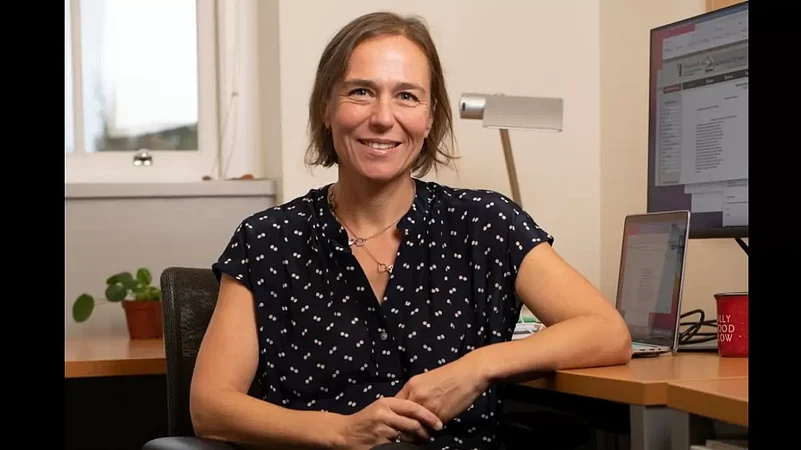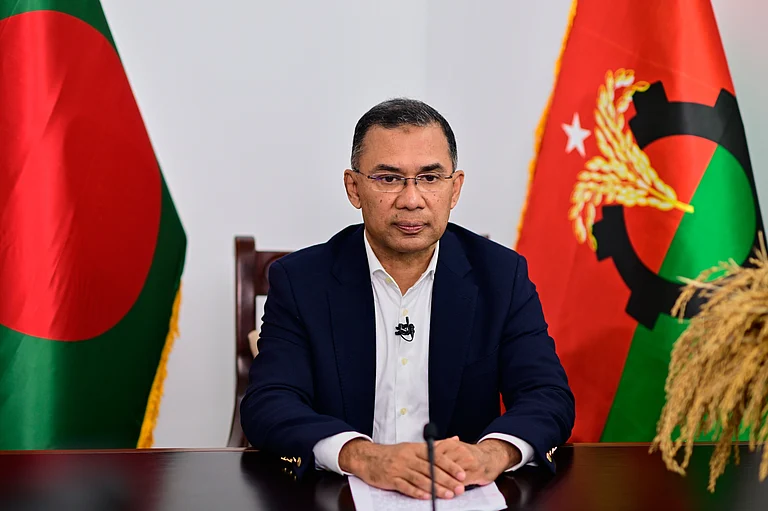On the occasion of World Translation Day, one can’t help but think of all those poets from ravaged Ukraine who are still trying to find meanings and hopes in words. However, the poems drenched in emotions of love, compassion, solidarities and hopes reach to us only through translations. We don’t know whether it can at all carry the sounds of explosives and missiles that rock hundreds of schools and hospitals at Kyiv- still we search the essence of human empathy in the debris of words. In this backdrop, Outlook speaks to translator and author Amelia Glaser who has been translating Ukrainian poets for years. Can the war be translated at all? Perhaps it translates the demands of justice- an unabated desire of vulnerable to be heard. Excerpts:
It is believed that meaning is lost in translation. What do you think of it?
We are always translating – no matter what we are doing. We lose meaning when we try to explain something in our own language, when we try and explain something to our own family members. So how much more is lost when we must switch to another symbolic system and cultural context? A lot, of course. But the beauty of translation is that we find things, too. We pick things up along the way, giving new ideas to our languages through the cross-fertilization.
Can the translation communicate similar meaning in different context?
I believe that translation as a linguistic process is by nature imperfect. Depending on the languages involved, it can be more or less accurate. If you’re translating between two related languages, for example, you can maintain some of the syntax of the original, and even the roots of the word. Translating between very different languages (like English and Ukrainian, for example) loses more. However, I do think that if you’re willing to sacrifice things like form, brevity, and sound, you can often communicate, or at least describe, the essence of what is truly important. So much of the translator’s task is just that – figuring out what is the essence of a thing that needs to be communicated and then finding a way to preserve that.
I’ve been translating from Ukrainian for a few years now. I also have translated from other languages – Russian, Yiddish, and Italian. I am often envious of translators working from Ukrainian into another Slavic language, like Polish, because so much more would be preserved, but perhaps the translations into English are more necessary, because we are further away, geographically, culturally, and linguistically.
As a translator who has been translating Ukrainian poetry now for years, what do you think about wars being translated into language and that being literally translated to other languages?
That’s a really good way of putting it. Poets sometimes describe what they are doing as translating the war into words. Iya Kiva, a poet I work with, has put it very similarly. And then here I am, not based in Ukraine but in California. And I’m trying to somehow convey those very difficult, complex ideas, that already can’t fully do justice to the experience itself, into new, English words. Inevitably, readers will end up with my interpretation, and I only hope that I’ve found English words that can approximate the original experience a bit, as well as the distance between the experience and the poem I’m translating.
Your question reminds me of Walter Benjamin’s analogy, which compared a translation to one manifestation of life in relation to the original, which is like the phenomenon of life. If aspects of the war are the phenomena that manifest themselves in Ukraine poems, then I hope that my English versions of these poems do justice to those poetic manifestations, but also (at a slight remove) to conveying the experience of war.
I am very much in awe of the poets who are remaking their entire world right now. They are rethinking the meaning of language while struggling to survive and to make sense of the flow of time. There’s no way I can fully understand, but I can do my best to be a good reader, and by extension, a reasonable translator.
I’ll add that it helps that I do most of my translating in a partnership with my dear friend and colleague Yuliya Ilchuk. Yuliya is from Ukraine, and we spend hours together not only making sense of the meaning of poetic language constructions, but also making sense of the ideas being conveyed, and trying to think of the right tone to convey those into English. Some poets also become partners in this process. Iya Kiva, whose work we are translating now, has spent countless hours with us on zoom going through our English variants and talking about the distance between languages. This is obviously a rare experience, but in a time like this, being able to work directly with the author is remarkable.

Can the agony of war in some contexts be translated into another context and another language?
I hope so. I mean, of course, no one can ever truly know another’s experience. But my dearest hope is that, by making Ukraine’s struggle more legible in English I am helping readers to think not only about Ukraine but also about other contexts where they can fight for justice.
In our translations of contemporary Ukrainian poetry, we have aimed to transmit a sense of the place – Ukraine – as well as the struggle. So we haven’t localized any of the violence to other situations. This strikes me as potentially dangerous in an ongoing war. However, some of the language we choose is drawn from an English vocabulary that may recall other struggles in unexpected ways. (For example, in a poem by Iya Kiva, we chose to use the term, “freedom song,” which was a fairly literal translation of one of her phrases, but also may suggest for some the spirituals from African American musical tradition. Iya was comfortable with this very subtle allusion)
What are the major challenges of translating poetry?
The hardest things to translate are what often make poetry poetic – the confluence of alliteration, internal rhymes, double-meanings, and subtle allusions. While you can never get all of these things, if you have a strong enough sense of what is poetic about the original, you can sometimes find ways of conveying some of the rhythm, music, and subtlety. And sometimes you get lucky and find a rather wonderful word or phrase in the target language. This is the kind of thing that keeps me up translating at night. In a good way.
What do you think about keeping the emotional essence intact?
I had a wonderful teacher who once shared with me her hierarchy of what to prioritize in translation. She used to tell me that the feeling was the most important thing. Next came the general meaning, next the literal meaning, and finally the form. This may not be the case for all genres, but certainly for poetry I believe the most important thing is how a reader feels after reading a poem.
Lastly, how do you read the recent surge in translation projects across globe? What will be your suggestion for the young translators?
I am very hopeful that translation has gained a kind of prestige, especially the translation of poetry. I come from a country that publishes shockingly little in translation. The American publishing industry seems to assume everything worth reading is in English. But a lot of readers feel differently and are translating writers that we need to be reading.
As a teacher, I have been very excited to see my students embrace translation. In fact, it was a group of students that helped me to found Alchemy, an online journal that my university (UC San Diego) publishes, devoted to promoting the work of emerging translators, including students. And we get really good submissions from a wide variety of languages.
To put in the time that’s needed to produce really thoughtful, careful work. A good translator is a good reader and also, I think, a good listener. So to translate well means to think about how to listen to another person’s perspective and experience.



























